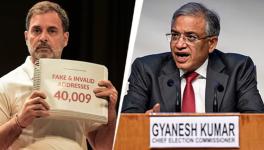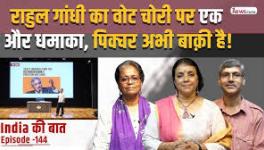Twists and Turns in Rahul Gandhi’s Defamation Trial
Congress leader Rahul Gandhi. Image Courtesy: PTI
On 24 March, Congress leader Rahul Gandhi was convicted and sentenced to two years imprisonment and fined Rs 15,000 by Harish Verma, Chief Judicial Magistrate of Surat, in a criminal defamation case filed by Gujarat BJP MLA and former Minister Purnesh Modi. The case was based on Rahul Gandhi’s remarks during an election rally in Karnataka in 2019. “I have a question. Why do all of them—all these thieves—have Modi, Modi, Modi in their names? Nirav Modi, Lalit Modi, Narendra Modi. And if we search a bit more, many more such Modis will come out,” he had said.
Interestingly, all those Gandhi named in his speech never moved court, and the complainant, Purnesh Modi, whom Gandhi did not refer to even obliquely, filed a defamation case. According to Senior Advocate Abhishek Manu Singhvi, Gandhi’s lawyer, this is the primary basis on which the conviction would be challenged in a higher court. The other ground, Singhvi has said, would be the Surat court’s jurisdiction. Gandhi’s remarks were made in Karnataka, and, therefore, it may not have been legally tenable for a magistrate’s court in Surat to have conducted these defamation proceedings without first ascertaining whether it had the power to consider this case.
While Judicial Magistrate Verma suspended the sentence and Gandhi got bail and thirty days to appeal in a higher court, the conviction remains valid and intact. Therefore, there is every possibility he may be disqualified as a Lok Sabha Member of Parliament on that count. [The “suspension” of his sentence simply means he would not be arrested right away.]
Gandhi’s trial reveals a strange scenario wherein, not the accused, Gandhi, but Purnesh Modi moved the Gujarat High Court to stay the trial proceedings. The chronology of the defamation case throws light on this aspect. The lawsuit was filed on 16 April 2019, and fourteen months after receiving a summons, Gandhi appeared in person before the Chief Judicial Magistrate of Surat, AN Dave. That was on 24 June 2021, and his statement was recorded then.
In March 2022, Purnesh moved the court again and pleaded that Gandhi must appear physically for a second time. Magistrate Dave turned down his request and ordered hearings in the case to begin immediately. Strangely, Purnesh Modi approached the Gujarat High Court with a prayer for a stay on the hearings. On 7 March 2022, the High Court accepted his request and stayed the trial. It baffled the legal fraternity. Top lawyers could not fathom how the complainant—not the accused—sought a stay in the High Court proceedings.
Singhvi said in an interview with journalist Rajdeep Sardesai that the complainant’s actions were “strange”. He expressed amazement that the same complainant then demanded the High Court to vacate the stay again—and that was after Magistrate Dave was transferred and Harish Verma, who convicted Rahul Gandhi, was posted in his place.
Singhvi, it is evident, was making the point that the turn of events leading to the conviction and sentencing of Gandhi was unusual. Some commentators have linked Purnesh Modi’s request to vacate the stay on the trial to Gandhi’s Lok Sabha speech, in which he raised questions about an alleged nexus between Prime Minister Narendra Modi and corporate giant Gautam Adani.
Another crucial point is that Magistrate Verma has given Gandhi the maximum punishment of two years. Usually, such a sentence is given to those who repeatedly commit an offence. But Gandhi is not a habitual offender, which raises the question whether his punishment seems disproportionate to the offence Magistrate Verma has found Rahul guilty of committing. According to Singhvi, the sentence is incompatible with the Offenders Act, whose provisions determine the quantum of punishment after considering the degree of an offence.
Several Congress party leaders and leading lawyers have reacted to Gandhi’s conviction. Many lawyers say Gandhi would be disqualified as a Member of Parliament since his conviction has not been stayed. Congress President Mallikarjun Kharge has also raised questions on the judgement. But even the Congress party’s rival Aam Aadmi Party has taken a stand. AAP chief and Delhi Chief Minister Arvind Kejriwal has expressed solidarity with Gandhi. He tweeted in Hindi: “A conspiracy is being hatched to eliminate non-BJP leaders and parties by prosecuting them. We have differences with the Congress, but it is not right to implicate Rahul Gandhi in a defamation case like this.” He added, “It is the job of the public and the Opposition to ask questions. We respect the court but disagree with the decision.”
Gandhi also tweeted a quote from Mahatma Gandhi. It said in Hindi, “My religion is based on truth and non-violence. Truth is my God, non-violence the means to get it.” This quote reminds one of Mahatma Gandhi’s advice of 1921 to a towering freedom fighter from Odisha, Utkalmani Gopabandhu Das, the founder editor of the leading Odia daily, The Samaja.
In 1921, Das asked Gandhi whether he should defend himself or not in a defamation case filed by some police constables against him as editor of the daily. Gandhi responded in a telegram, “Only file bold true statement never mind consequences.” Rahul’s tweet citing Gandhi reminds me of this advice from almost a century ago. Let truth prevail.
The author served as Officer on Special Duty to President of India KR Narayanan. The views are personal.
Get the latest reports & analysis with people's perspective on Protests, movements & deep analytical videos, discussions of the current affairs in your Telegram app. Subscribe to NewsClick's Telegram channel & get Real-Time updates on stories, as they get published on our website.
























